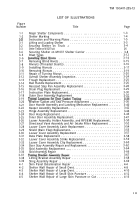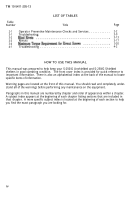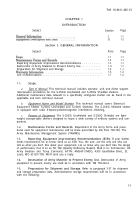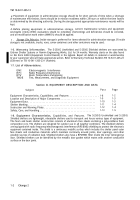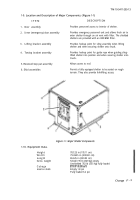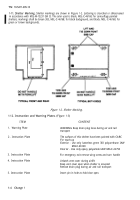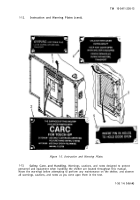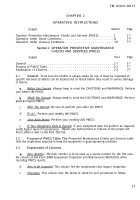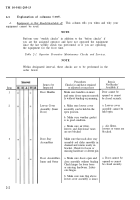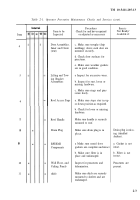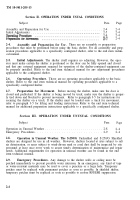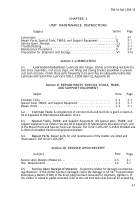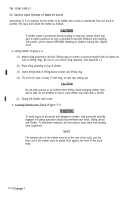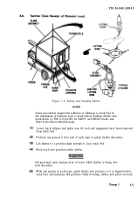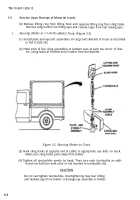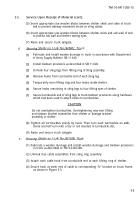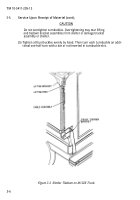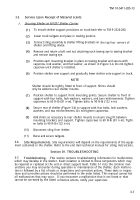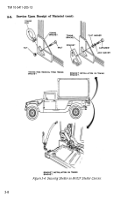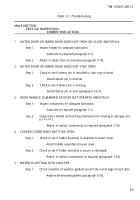TM-10-5411-205-13 - Page 17 of 127
2-7
TM 10-5411-205-13
Section II. OPERATION UNDER USUAL CONDITIONS
Subject
Para
Page
Assembly and Preparation for Use . . . . . . . . . . . . . . . . . . . . . . . . . . . 2-4
2-4
Initial Adjustments . . . . . . . . . . . . . . . . . . . . . . . . . . . . . . . . . . . . . 2-5
2-4
2-6
2-4
2-4
2-4.
Assembly and Preparation for Use.
There are no assembly or preparation
procedures that must be performed before using the basic shelter. For all asssembly and prep-
aration procedures applicable to a specifically configured shelter, refer to the end item techni-
cal manual.
2-5.
Initial Adjustments.
The shelter itself requires no adjusting. However, the oper-
ator must make certain the shelter is positioned so the door can be fully opened and closed
and that any external equipment required for operation of the shelter-contained equipment can
be properly installed. Refer to the end item technical manual for anv adjustment procedures
applicable to the configured shelter.
2-6.
Operating Procedure.
There
shelter. Refer to the end item technical
specifically configured shelter.
2-7.
Preparation for Movement.
are no operating procedures applicable to the basic
manual for operating procedures applicable to a
Before moving the shelter, make sure the door is
closed and padlocked. If the shelter is being moved by truck, make sure the shelter is proper-
ly tied down and blocked to prevent movement.
Refer to paragraph 3-5 for instructions for
securing the shelter on a truck. If the shelter must be loaded onto a truck for movement,
refer to paragraph 3-5 for lifting and loading instructions. Refer to the end item technical
manual for additional preparation instructions applicable to a specifically configured shelter.
Section III. OPERATION UNDER UNUSUAL CONDITIONS
Subject
Para
Page
Operation in Unusual Weather . . . . . . . . . . . . . . . . . . . . . . . . . . . . . 2-8
2-4
Emergency Procedures.
. . . . . . . . . . . . . . . . . . . . . . . . . . . . 2-9
2-4
2-8.
Operation in Unusual Weather. The S-250/G
Unshielded and S-250/G Shielded
shelters are designed for use in all weather.
However, shelters located at sites subject to salt
air deterioration, or areas subject to wind-driven sand or coral dust shall be inspected by site
personnel at least once every week to assure timely determination of maintenance and repair
needs. Additional requirements for operation in unusual weather can be found in the end
item technical manual.
2-9.
Emergency Procedures.
Any damage to the shelter walls or ceiling must be
patched immediately to prevent possible water intrusion. In an emergency, any kind of tape
or water-resistent materials may be used to cover a puncture or a large hole. Temporary
patches must be replaced with permanent patches as soon as possible. In shielded shelter,
temporary patches must be replaced as soon as possible to restore RFI/EMI suppression.
2-4
Back to Top

